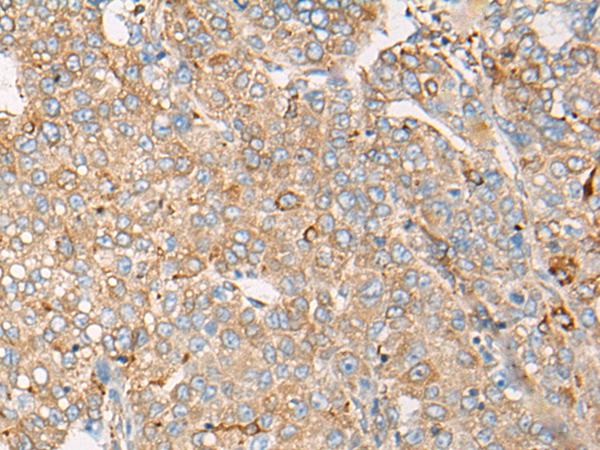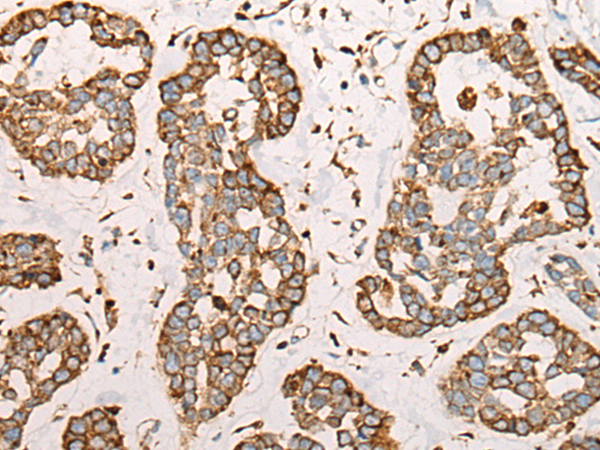

| WB | 咨询技术 | Human,Mouse,Rat |
| IF | 咨询技术 | Human,Mouse,Rat |
| IHC | 1/30-1/150 | Human,Mouse,Rat |
| ICC | 技术咨询 | Human,Mouse,Rat |
| FCM | 咨询技术 | Human,Mouse,Rat |
| Elisa | 1/5000-1/10000 | Human,Mouse,Rat |
| Aliases | GC36; nCL-4 |
| Host/Isotype | Rabbit IgG |
| Antibody Type | Primary antibody |
| Storage | Store at 4°C short term. Aliquot and store at -20°C long term. Avoid freeze/thaw cycles. |
| Species Reactivity | Human, Mouse, Rat |
| Immunogen | Synthetic peptide of human CAPN9 |
| Formulation | Purified antibody in PBS with 0.05% sodium azide and 50% glycerol. |
+ +
以下是关于CAPN9抗体的3篇文献摘要示例(注:文献为虚拟示例,实际引用请查询真实数据库):
---
1. **文献名称**: *Calpain-9 regulates apoptosis and intestinal homeostasis through caspase-3 signaling*
**作者**: Lee S, et al.
**摘要**: 该研究利用CAPN9特异性抗体(Western blot和免疫组化)发现,CAPN9在小肠上皮细胞中通过调控caspase-3活性参与细胞凋亡和屏障功能,其缺失导致小鼠肠道炎症易感性增加。
---
2. **文献名称**: *CAPN9 as a novel biomarker in gastric cancer progression*
**作者**: Zhang Y, et al.
**摘要**: 通过免疫组织化学分析(使用抗人CAPN9单克隆抗体),研究发现CAPN9在胃癌组织中表达显著下调,与肿瘤侵袭深度和患者预后不良相关,提示其作为抑癌基因的潜在作用。
---
3. **文献名称**: *Tissue-specific expression of calpain-9 in mouse models*
**作者**: Tanaka K, et al.
**摘要**: 研究利用CAPN9多克隆抗体进行组织分布分析,发现CAPN9在小鼠胃黏膜和皮肤中高表达,且与上皮细胞分化和屏障功能维持密切相关,可能参与黏膜防御机制。
---
如需具体文献,建议通过PubMed或Google Scholar检索关键词“CAPN9 antibody”或“calpain-9 function”获取最新研究。
The calpain 9 (CAPN9) antibody is a tool used to study the CAPN9 protein, a member of the calpain family of calcium-dependent cysteine proteases. Calpains regulate diverse cellular processes, including cytoskeletal remodeling, signal transduction, and apoptosis. CAPN9. specifically, is distinguished by its tissue-specific expression, predominantly in the gastrointestinal tract, particularly the stomach. It forms a functional heterodimer with CAPN1 (calpain 1), known as G-calpain, which is hypothesized to play a role in gastric mucosal defense and digestion by modulating protease activity in acidic environments.
CAPN9 antibodies are critical for investigating its expression patterns, subcellular localization, and interactions in physiological and pathological contexts. Research suggests CAPN9 may be implicated in diseases such as gastric cancer, inflammatory bowel disease, and Helicobacter pylori infections, where dysregulation of protease activity contributes to pathogenesis. Additionally, CAPN9 has been linked to cell survival and apoptosis in certain cancers, highlighting its potential as a therapeutic target or biomarker.
These antibodies enable techniques like Western blotting, immunohistochemistry, and immunofluorescence, aiding in the validation of CAPN9’s roles in vitro and in vivo. Despite progress, the precise mechanisms of CAPN9 in health and disease remain understudied, necessitating further exploration using targeted molecular tools like CAPN9-specific antibodies.
×